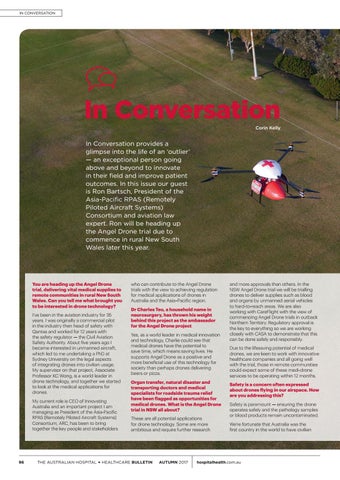IN CONVERSATION
In Conversation
Corin Kelly
In Conversation provides a glimpse into the life of an ‘outlier’ — an exceptional person going above and beyond to innovate in their field and improve patient outcomes. In this issue our guest is Ron Bartsch, President of the Asia-Pacific RPAS (Remotely Piloted Aircraft Systems) Consortium and aviation law expert. Ron will be heading up the Angel Drone trial due to commence in rural New South Wales later this year.
You are heading up the Angel Drone trial, delivering vital medical supplies to remote communities in rural New South Wales. Can you tell me what brought you to be interested in drone technology? I’ve been in the aviation industry for 35 years. I was originally a commercial pilot in the industry then head of safety with Qantas and worked for 12 years with the safety regulator — the Civil Aviation Safety Authority. About five years ago I became interested in unmanned aircraft, which led to me undertaking a PhD at Sydney University on the legal aspects of integrating drones into civilian usage. My supervisor on that project, Associate Professor KC Wong, is a world leader in drone technology, and together we started to look at the medical applications for drones. My current role is CEO of Innovating Australia and an important project I am managing as President of the Asia-Pacific RPAS (Remotely Piloted Aircraft Systems) Consortium, ARC, has been to bring together the key people and stakeholders
96
who can contribute to the Angel Drone trials with the view to achieving regulation for medical applications of drones in Australia and the Asia–Pacific region. Dr Charles Teo, a household name in neurosurgery, has thrown his weight behind this project as the ambassador for the Angel Drone project. Yes, as a world leader in medical innovation and technology, Charlie could see that medical drones have the potential to save time, which means saving lives. He supports Angel Drone as a positive and more beneficial use of this technology for society than perhaps drones delivering beers or pizza. Organ transfer, natural disaster and transporting doctors and medical specialists for roadside trauma relief have been flagged as opportunities for medical drones. What is the Angel Drone trial in NSW all about? These are all potential applications for drone technology. Some are more ambitious and require further research
THE AUSTRALIAN HOSPITAL + HEALTHCARE BULLETIN
AUTUMN 2017
and more approvals than others. In the NSW Angel Drone trial we will be trialling drones to deliver supplies such as blood and organs by unmanned aerial vehicles to hard-to-reach areas. We are also working with CareFlight with the view of commencing Angel Drone trials in outback Northern Territory. Regulatory approval is the key to everything so we are working closely with CASA to demonstrate that this can be done safely and responsibly. Due to the lifesaving potential of medical drones, we are keen to work with innovative healthcare companies and all going well with the trial, those in remote communities could expect some of these medi-drone services to be operating within 12 months. Safety is a concern often expressed about drones flying in our airspace. How are you addressing this? Safety is paramount — ensuring the drone operates safely and the pathology samples or blood products remain uncontaminated. We’re fortunate that Australia was the first country in the world to have civilian
hospitalhealth.com.au
